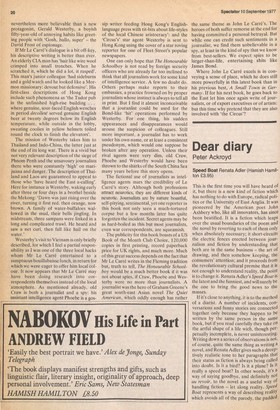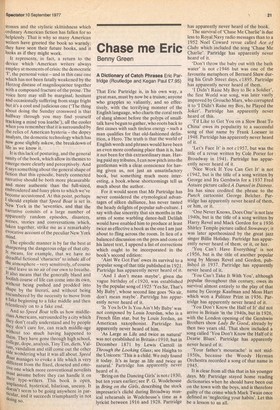Dear diary
Peter Ackroyd
Speed Boat Renate Adler (Hamlet) Hamilton 23.95) This is the first time you will have heard of it, but there is a new kind of fiction which has nothing to do with Europe, radical politics or the University of East Anglia. It was pioneered by the American poet John Ashbery who, like all innovators, has since been beatified. It is a fiction which leaps over the usual boundaries of the poem and the novel by reverting to each of them only when absolutely necessary; it short-circuits the electric fences erected between journalism and fiction by understanding that both are in the same business — the art of drawing, and then somehow keeping, the consumers' attention; and it proceeds from the revolutionary cultural premise that it is not enough to understand reality, the point is to change it. Renata Adler's Speed Boat is the latest and the funniest, and will surely be the one to bring the good news to the masses.
If it's close to anything, it is to the method of a diarist. A number of incidents, conversations and funny stories are connected together only because they happen to be written by the same person in the same book, but if you read carefully they take on the artful shape of a life wich, though perpetually incomplete, is never uninteresting. Writing down a series of observations is not, of course, quite the same thing as writing a novel, and Renata Adler gives such a deceptively realistic tone to her paragraphs that their status as fiction is always being called into doubt. Is it a bird? Is it a plane? Is it really a speed boat? In other words, it's a way of saying goodbye, and definitely not au revoir, to the novel as a useful way of handling fiction — let along reality. Speed Boat represents a way of describing realltY which avoids all of the parody, the padded ironies and the stylistic skittishness which ordinary American fiction has fallen for so helplessly. That is why so many American writers have greeted the book so warmly: they have seen their future books, and it looks as if they might work.
It represents, in fact, a return to the device which American writers always employ at moments of crisis: the democratic 'I', the personal voice and in this case one which has not been fatally weakened by the Herzog disease of magniloquence together With a compound fracture of the prose. The voice here may still be marginal, hesitant and occasionally suffering from stage fright but it's a cool and judicious one (`The thing about doing the Sunday crossword is that halfway through you may find yourself tracking a mind you loathe'), all the cooler When you remember that it is surrounded by the relics of American hysteria the dopey analysts, the domestic technology which has now gone slightly askew, the breakdown of life as we know it.
It is this lack of posturing, and the general sanity of the book, which allow its themes to emerge more clearly and perceptively. And it says something about the general shape of fiction that this episodic, barely connected narrative should be both more pleasurable and more authentic than the full-sized, embroidered and fussy plots to which we've become accustomed. At this point, perhaps I should explain that Speed Boat is set in, New York in the 'seventies, and that the narrative consists of a large number of aPparently random episodes, disasters, scenes, stories and conversations which, taken together, strike me as a remarkably evocative account of the peculiar New York mind.
The episodic manner is by far the best at Sharpening the dangerous edge of that city. It means, for example, that we have no dreadful fictional 'character' to inhale all of the atmosphere very sensitively, of course and leave us no air of our own to breathe. It also means that the generally bland and foolish course of life can come into its own, Without being pushed and prodded into Shape by the literati, and without being encumbered by the necessity to move from a fake beginning to a fake middle and then relentlessly on to a fake end.
And so Speed Boat tells us how middleclass Americans, surrounded by a city which they don't really understand and by people they don't care for, can reach middle-age Without too much having happened to them. They have gone through high school, Follege, dope, analysis, Tiny Tim, diets, ValM, vandalism and still come out the other side wondering what it was all about. Speed Boat Manages to evoke a life which is very different from the fixed, closeted and emotive one which more conventional novelists Must assume before they can handle it on their type-writers. This book is open, u.nplanned, hysterical, hilarious, uneasy. It dtoesn't seem to be going anywhere in parAlcular, and it succeeds triumphantly in not 1/41()ing so.































 Previous page
Previous page